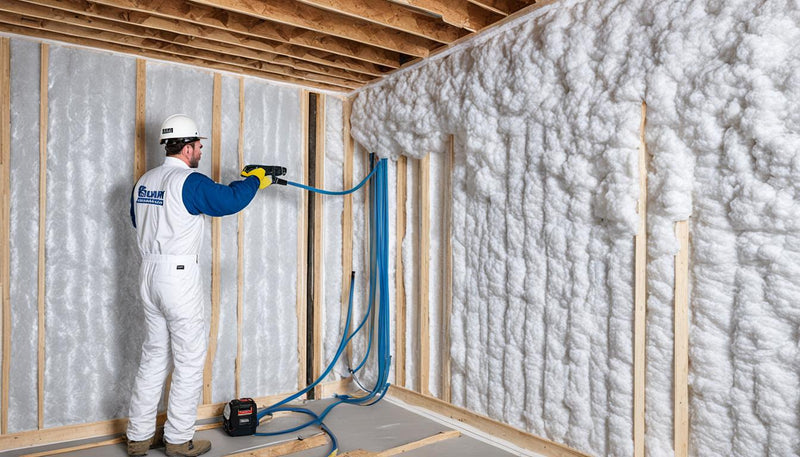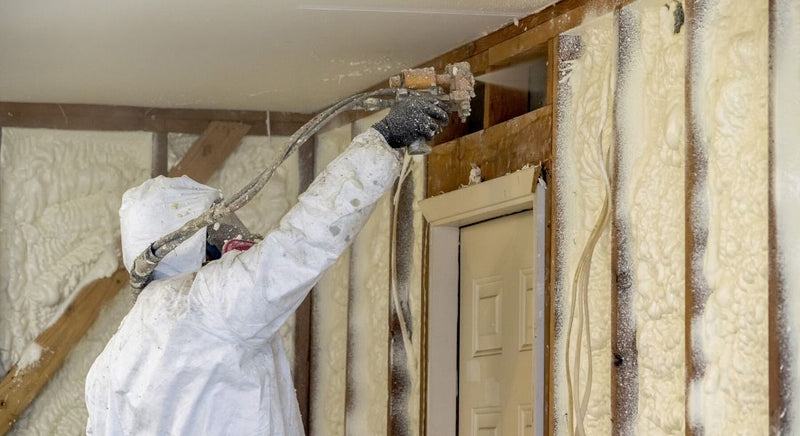Picking the Right Type of Spray Foam for Your Insulation Requirements
Picking the Right Type of Spray Foam for Your Insulation Requirements
Blog Article
Spray Foam: The Ultimate Service for Air Sealing and Insulation
Spray foam insulation has arised as a leading option for effective air securing and thermal insulation, providing an one-of-a-kind combination of residential or commercial properties that set it apart from conventional techniques. Comprehending the full scope of its advantages, installment processes, and comparisons with various other insulation types is important for making notified decisions.
What Is Spray Foam?
Spray foam is a versatile insulation material that incorporates the principles of air sealing and thermal resistance to improve energy performance in structures. Made up primarily of polyurethane or various other comparable substances, spray foam is used as a liquid that expands upon call with surface areas, producing a solid, continual layer of insulation. This special home enables it to load spaces, splits, and voids that typical insulation products may forget, supplying a premium air seal.
There are two main sorts of spray foam: open-cell and closed-cell. Open-cell spray foam is lighter and a lot more adaptable, supplying exceptional noise absorption and a reduced R-value per inch - Spray Foam. On the other hand, closed-cell spray foam is denser, giving a higher R-value, wetness resistance, and included architectural integrity to building components
The application procedure usually includes specialized equipment, making sure a seamless application that abides by various substrates, including concrete, wood, and metal. This versatility makes spray foam ideal for both new constructions and retrofitting existing structures. Its capability to create an airtight obstacle dramatically adds to lowering power usage and improving indoor air quality, thereby making it a recommended option among house owners and building contractors alike.
Advantages of Spray Foam Insulation
One of one of the most significant benefits of spray foam insulation is its exceptional capability to produce a constant air obstacle, which properly reduces power loss. Unlike conventional insulation materials, spray foam expands to fill spaces and fractures, guaranteeing that air leakage is significantly lowered. This characteristic not just boosts power efficiency yet likewise results in decrease energy expenses with time.
Furthermore, spray foam insulation provides remarkable thermal resistance, adding to a much more secure interior setting. Its high R-value per inch permits for efficient insulation in confined areas, making it suitable for attics, wall surfaces, and crawl rooms. Moreover, the moisture-resistant residential or commercial properties of spray foam assistance avoid mold and mildew development, advertising healthier living conditions.
An additional crucial advantage of spray foam insulation is its sound-dampening top qualities (Spray Foam). It efficiently minimizes sound transmission in between areas, creating a quieter and much more comfortable home atmosphere. The sturdiness of spray foam additionally sticks out, as it does not sag or work out gradually, preserving its efficiency throughout its life expectancy
How Spray Foam Works
Comprehending just how spray foam insulation works is important for appreciating its effectiveness in air securing and thermal resistance. Spray foam insulation includes 2 main components: isocyanate and polyol resin. When these parts are combined, they undertake a chemical response that triggers the material to expand swiftly, producing a dense foam that fills up fractures, dental caries, and voids.
As the foam increases, it sticks to surface areas, forming an impermeable seal that dramatically lowers air seepage. This characteristic makes spray foam insulation highly effective at preventing drafts and dampness penetration, which can cause energy loss and damages with time. In addition, the closed-cell version of spray foam uses premium thermal resistance as a result of its rigid framework, effectively minimizing warmth transfer.
The try here one-of-a-kind properties of spray foam allow it to comply with irregular surfaces, ensuring extensive protection and a smooth obstacle. Therefore, spray foam insulation not only improves power effectiveness but additionally adds to improved interior air quality by lowering the build-up of pollutants and allergens. Ultimately, recognizing the mechanics behind spray foam highlights its duty as a superior selection for insulation and air sealing in both domestic and commercial applications.
Setup Process Introduction

Prior to installment, the space has to be appropriately cleaned up and prepped, ensuring that surfaces are cost-free from wetness, debris, and dirt. This step is crucial due to the fact that pollutants can jeopardize adhesion and overall efficiency. As soon as the area is prepared, the application includes blending both parts of the spray foam, which expands upon call and loads voids properly.
Educated experts need to conduct the installment, using customized tools to guarantee uniform coverage and optimal density. Safety and security precautions, including using protective gear and making certain correct ventilation, are essential throughout this procedure. After application, the foam usually cures swiftly, forming a strong barrier that enhances power efficiency.
Comparing Spray Foam to Conventional Insulation
When reviewing insulation alternatives, spray foam insulation stands out in comparison to conventional products such as fiberglass and cellulose. Unlike fiberglass and cellulose, which can enable air infiltration, spray foam increases upon application, filling spaces and holes to produce an impermeable seal.
Furthermore, spray foam gives a higher R-value per inch than conventional insulation types, supplying more efficient thermal resistance in a Read Full Article thinner profile. This characteristic is specifically useful precede with restricted cavity deepness. In addition, spray foam is resistant to dampness and mold and mildew development, which can be a significant interest in cellulose and fiberglass, especially in humid settings.
Nevertheless, spray foam insulation generally carries a greater upfront cost than its standard counterparts. Property owners must consider this initial investment versus long-lasting energy financial savings and efficiency benefits. Eventually, while both insulation types offer their purpose, spray foam arises as an extra advanced solution for modern-day insulation requirements, especially i loved this in terms of air sealing and thermal performance.

Final Thought
In summary, spray foam insulation stands for an extremely reliable option for accomplishing optimal air securing and thermal resistance. Its unique properties, consisting of dampness resistance and sound dampening, make it suitable for different applications in both new building and constructions and retrofitting tasks (Spray Foam). The preliminary prices may be higher contrasted to conventional insulation materials, the long-lasting benefits, such as considerable power cost savings and improved interior air high quality, warrant the financial investment and highlight its value in contemporary structure methods.
Spray foam insulation has emerged as a leading remedy for efficient air sealing and thermal insulation, providing a distinct combination of homes that set it apart from standard techniques.Spray foam is a flexible insulation material that integrates the concepts of air securing and thermal resistance to improve energy effectiveness in structures.When evaluating insulation options, spray foam insulation stands out in contrast to standard products such as fiberglass and cellulose. Ultimately, while both insulation kinds serve their objective, spray foam emerges as a more advanced service for contemporary insulation demands, specifically in terms of air securing and thermal effectiveness.
In summary, spray foam insulation represents a very reliable option for achieving optimum air sealing and thermal resistance.
Report this page